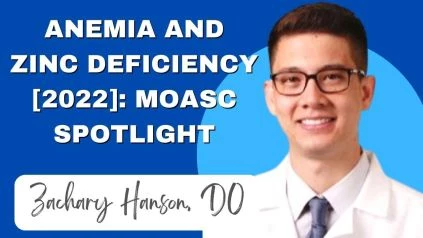Anemia and Zinc Deficiency [2022]: MOASC Spotlight
Â
Zachary Hanson, DO MOASC Poster on Anemia Zinc Deficiency 2022
Hi, I’m Dr. Zachary Hanson from Loma Linda University Medical Center under the direction of Dr. Tari in the medical cancer center. I’ve done a research project I’d love to present to you guys. And so what we’ve done is we’ve done a retrospective review of patients with chronic anemia that was also found to have a (mild) zinc deficiency.
Â
And so what we’ve done is we’ve looked at these patients with (severe) zinc deficiency supplemented with supplemental zinc (intake for zinc concentration and zinc absorption) and tracked their hemoglobin over time. And the reason that we’ve done this is that in many developed countries, many of their food supplies have been fortified with zinc supplements, as well as iron full eight and B12.
Â
And we’ve noticed that there have been improvements in hemoglobin. And so it begs the question for patients who have chronic anemia of unknown other etiologies where zinc where things like iron have already been supplemented B12 and full later normal. Is there a role for zinc in supplementation to improve these patients’ anemia?
What Did These Data Show For Zinc Supplementation?
And so, we found 43 patients that had concurrent zinc deficiency with anemia, and they were followed for about a year with hemoglobins followed at 1, 3, 6, and 12 months time markers. And what we found was that these patients had baseline hemoglobin at around 10. And then, after one month of supplementation, there was no significant improvement in the hemoglobin.
Â
But we did quantify that the average hemoglobin was 10.6 at three months. There was a statistically significant change where the hemoglobin came to 10.9 at six months. It improved to 11.2, and at 12 months, the hemoglobin is stated 11.2 overall. We were able to find that 40% of these patients had a complete resolution of their anemia based on theirs.
What Were Your Conclusions And Was There Severe Zinc Deficiency in Regards to Zinc Intake?
So overall, we could also look at this in a descriptive way based on each time marker. How many patients started to improve their anemia? So we found that at one month, for patients with 0.5 improvements in their hemoglobin, there was about 54% of those patients showed improvement.
Â
And then, patients that had one hemoglobin change were found in about 43%. And that was found in a step-wise improvement over those 12. So overall, what we found was that zinc supplementation significantly improved patient anemia, with a resolution of anemia found in 40% of the patients that improved in a stepwise manner.
What Was the Study Design?
So as a retrospective study, this is a launching point for a further question of if zinc is an erythrocyte stimulating agent for these patients and needs to be supplemented in our chronic anemia patients that aren’t found to have other ideologies. There are currently other studies that are ongoing at Loma Linda to determine the pathophysiology of the zinc supplementation and why this works as well. As this study continues to ongoing recruitment, as well as follow-up with these patients. Thank you for your time.
Â
Justin Moyer, MD – ASCO 2022 Melanoma Cancer Question & Answer
https://oncologytube.com/video/41313
Â
Justin Moyer, MD – ASCO 2022 Melanoma Overview: MOASC Spotlight
https://oncologytube.com/v/41283
Â
Justin Moyer, MD – ASCO 2022 Melanoma In-Depth Slides: MOASC Spotlight
https://oncologytube.com/v/41289
Zachary Hanson, DO – About The Author, Credentials, and Affiliations
Dr. Zachary Hanson is currently serving as a resident physician at Loma Linda University, where he has hopes of completing a fellowship in hematology oncology.

